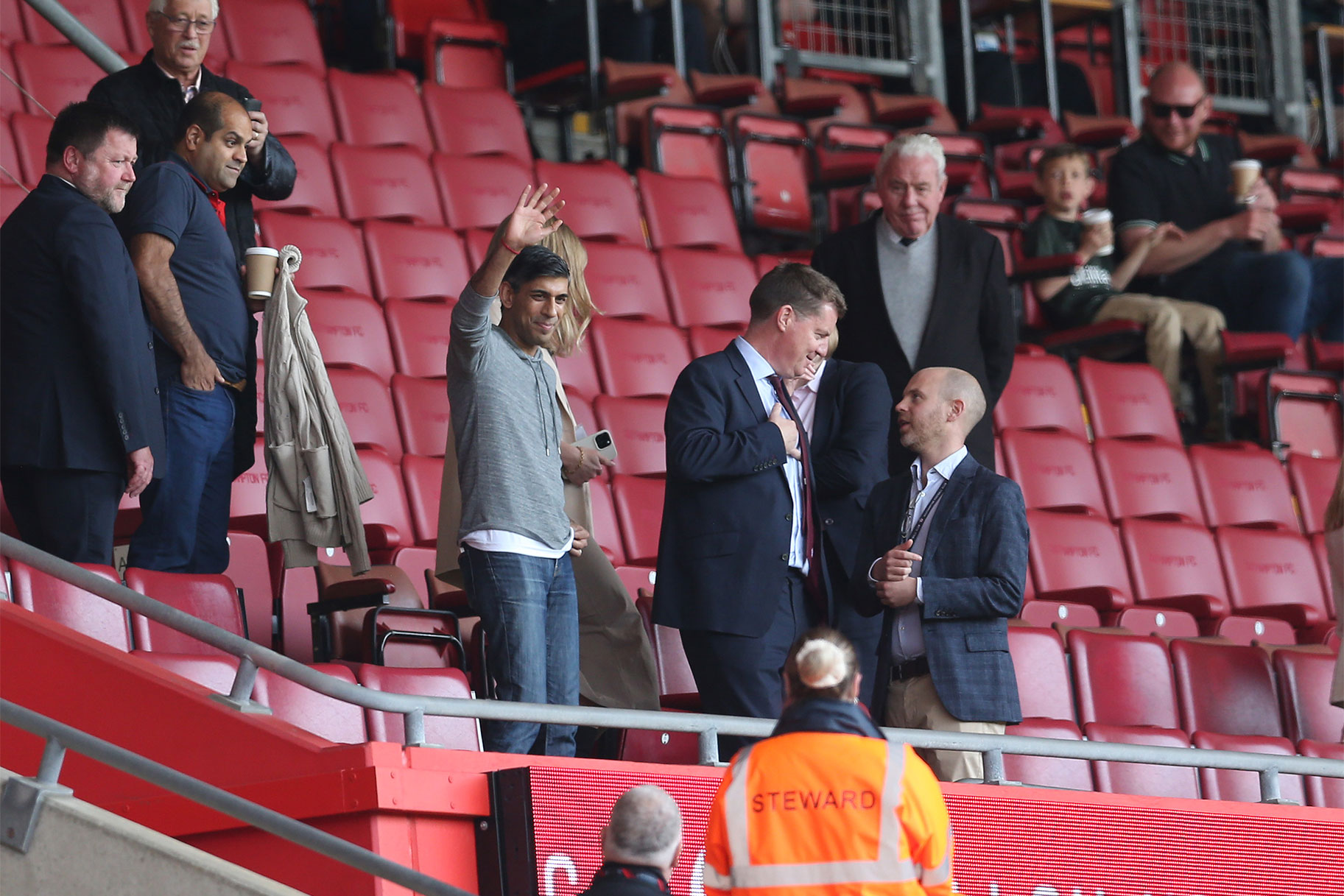Create a free profile to get unlimited access to exclusive show news, updates, and more!
UK Prime Minister Vows to Ban Premier League Teams from Joining European Super League
Rishi Sunak’s government has created the Football Governance Bill to block British clubs from joining any emerging league.

After the Court of Justice of the European Union announced on Thursday its landmark ruling that UEFA and FIFA acted unlawfully when the football governing bodies stopped the emergence of the European Super League (ESL) from ever coming to fruition, United Kingdom Prime Minister Rishi Sunak has pledged to ban English Premier League clubs from joining the new league as it regains momentum.
The “Big Six” Premier League clubs — Arsenal, Chelsea, Liverpool, Manchester United, Manchester City and Tottenham Hotspur — had secretly agreed in 2021 to join the proposed breakaway competition, according to The Independent, inciting outrage from fans and then-Prime Minister Boris Johnson, who lambasted the league as a cash grab that would gut local football tradition.
RELATED: Who Are the Youngest Players To Ever Score a Goal in the Premier League?
What is the European Super League?
At the time, the new league was meant to be a scrumptious treat for footy fans around the world, allowing the best of the best in Europe to compete against one another in a “closed shop” construction, but the endeavor was immediately engulfed in fiery controversy after fans and the governing football bodies of UEFA and FIFA voiced their heated opposition, slamming it as merely a money-grabbing scheme. Now, the European Court of Justice has opened the door to give the ESL another shot.
What did the Court of Justice of the European Union state in its European Super League ruling?
“The FIFA and UEFA rules on prior approval of interclub football competitions, such as the Super League, are contrary to EU law,” the court declared in its ruling. “They are contrary to competition law and the freedom to provide services. The FIFA and UEFA rules making any new interclub football project subject to their prior approval, such as the Super League, and prohibiting clubs and players from playing in those competitions, are unlawful.
“There is no framework for the FIFA and UEFA rules ensuring that they are transparent, objective, non-discriminatory and proportionate," the Court of Justice continued.
The court added, "That does not mean that a competition such as the Super League project must necessarily be approved. The Court, having been asked generally about FIFA and UEFA rules, does not rule on that specific project in its judgement."
In response to the watershed court ruling, a spokesperson for the UK's Department for Culture, Media & Sport (DCMS) harkened back to the initial public outrage that the ESL’s formation created.
“The attempt to create a breakaway competition was a defining moment in English football and was universally condemned by fans, clubs and the government,” said the DCMS spokesperson, according to The Sun. “We took decisive action at the time by triggering the fan-led review of football governance, which called for the creation of a new independent regulator for English football.”
"We will shortly be bringing forward legislation that makes this a reality, and will stop clubs from joining any similar breakaway competitions in the future.”
In noting the need for a football regulator with legal authority to stop clubs from leaving UK leagues to join breakaway endeavors, Tracy Crouch, a Tory Member of Parliament, has also publicly denounced the formation of the European Super League and supported Sunak’s crusade to stop English Premier League clubs from joining it.
"I am pleased that the Rishi Sunak, a passionate football fan himself, recognizes that fans throughout the pyramid want to see the long-term financial sustainability of their clubs and have a greater say in how they are run,” Crouch previously said, according to The Sun.
"On the pitch, English football is admired the world over, but it is important that measures are put in place to ensure our national game is fit for the future,” she added. "This is exactly what an Independent Regulator will do."
RELATED: Why Were Everton Hit with the Largest Points Deduction Penalty in Premier League History?
Spearheading the resurgence of the controversial European Super League is Madrid-based sports marketing firm A22, which has overhauled its plan to include a field of 64 men’s clubs and 32 women’s clubs. Integrated into the new, revamped plans is a structure for promotion and relegation within a three-tier format — Star, Gold and Blue. Split between an equal number of home and away games, seasons would be comprised of 14 matches before the top teams battle it out in a postseason playoff format.
“Today is a historic day for football,” A22 CEO Bernd Reichart said in a video posted to X. “Because the EU’s highest court ruled to end UEFA’s monopoly over European club football. ... It proves UEFA’s dominant role was unfair. More importantly, clubs now have the right to discuss fresh ideas and proposals without fear of sanctions, including those for a new European cross-border club competition.”
While LaLiga titans Barcelona and Real Madrid are the two biggest supporters of the European Super League, their Premier League counterpart Manchester United released its own statement opposing the league.
“Our position has NOT changed,” reads the statement from Old Trafford. “We remain fully committed to participation in UEFA competitions, and to positive cooperation with UEFA, the Premier League, and fellow clubs through the ECA on the continued development of the European game.”
Perpetually heavyweight contenders of the Bundesliga, Bayern Munich also reiterated a similar position to the Red Devils.
In his rebuke of the momentous court ruling, UEFA President Aleksander Ceferin echoed the same bristling sentiment put forward by the DCMS and Crouch.
“I hope they know what they are doing which I’m not so sure about,” Ceferin said, according to Sky Sports News. “Football is not for sale. We can show that many times. We did all together, all the football stakeholders, and all the European society, and nothing, absolutely nothing can change that.”













